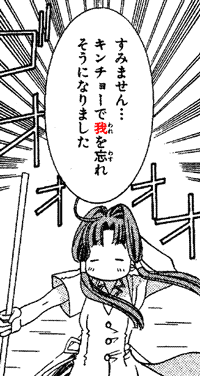In Japanese, ware 我 means "I," or "me." It's a literary first person pronoun that particularly emphasizes one's very existence,. It's not used normally, except in some set phrases, and by some anachronistic or deity-like anime characters.
It's also spelled ware 吾.
Nuances
The pronoun ware 我 is very different from other Japanese first person pronouns, for multiple reasons.
It's archaic, in the sense that it was used more normally in old Japanese, but nowadays its usage is limited to literary, profound sounding statements, and a number of set phrases.
- ware nagara
我ながら
While [it] is myself. (literally.)
Even if I say so myself.
- Context: Mizunashi Akari 水無灯里, a wannabe gondolier, gets nervous rowing a boat for the first time, rowing too fast until the passenger tells her to slow down.
- sumimasen...
すみません・・・
Sorry... - kinchou de {ware wo wasure-sou ni} narimashita
キンチョーで我を忘れそうになりました
[I] became`{close to forgetting myself} due to nervousness. (literally.)- ware wo wasureru
我を忘れる
To forget oneself.
To be so focused in doing a task that you forget your own existence, in the sense of doing only one thing and forgetting about your surroundings (the passenger), or a greater objective.
- ware wo wasureru
When used for profound-sounding effect, it tends to be accompanied by other archaisms, like ending a sentence with ~nari ~なり, or using the literary copula de aru である.
Characters that use ware in anime tend to be hundreds and hundreds of years old, or have transcended physical bodies, referring to themselves by their very existence instead, in which case, they're often deities or machine-like spiritual beings that are difficult to negotiate with.
Normally, a pronoun takes the no の particle to become a possessive no の adjective. While this is also possible with ware 我, its possessive is often a completely different word instead:
- waga
我が, also spelled 我ヶ
My. Mine.- Comes from a 我, as in aga-kimi 吾君, "my lord," becoming waga-kimi 我が君.(学研全訳古語辞典)
- The ga が particle has an archaic possessive function.
- ware no
我の
Ironically, waga 我が is more common in modern Japanese than ware.
Similarly, a pronoun takes a pluralizing suffix like ~tachi ~たち to become plural. The word ware 我 can take the ~ra ~ら suffix, but it normally becomes plural through reduplication instead.
- wareware
我々
We. Us. - warera
我ら
Typically, wareware 我々 is used to refer to one's organization, or a group they're member of.
One difference between these two words is that warera takes the ga が possessive sometimes.
- warera ga kuni
我らが国
Our country.
This pronoun is normally used to refer to an organization one represents, or one's party, country, species, etc.
- Context: a wild UFO appears.
- wareware wa uchuujin desu
我々は宇宙人です
We are aliens.
References
- 我 - 学研全訳古語辞典 via kobun.weblio.jp, accessed 2021-01-02.

No comments: